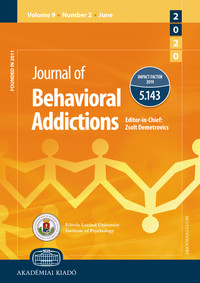Correlations between mobile phone addiction and anxiety, depression, impulsivity, and poor sleep quality among college students: A systematic review and meta-analysis
Correlations between mobile phone addiction and anxiety, depression, impulsivity, and poor sleep quality among college students: A systematic review and meta-analysis
Author(s): Ying Li, Guangxiao Li, Li Liu, Hui WuSubject(s): Behaviorism
Published by: Akadémiai Kiadó
Keywords: Mobile phone addiction; anxiety; depression; impulsivity; sleep quality; college students; meta-analysis
Summary/Abstract: Background and aims. Mobile phone addiction (MPA) is frequently reported to be correlated with anxiety, depression, stress, impulsivity, and sleep quality among college students. However, to date, there is no consensus on the extent to which those factors are correlated with MPA among college students. We thus performed a meta-analysis to quantitatively synthesize the previous findings. Methods. A systematic review and meta-analysis was conducted by searching PubMed, Embase, Cochrane Library, Wanfang, Chinese National Knowledge Infrastructure (CNKI), China Science and Technology Journal Database (VIP), and Chinese Biological Medicine (CBM) databases from inception to August 1, 2020. Pooled Pearson's correlation coefficients between MPA and anxiety, depression, impulsivity, and sleep quality were calculated by R software using random effects model. Results. Forty studies involving a total of 33, 650 college students were identified. Weak-to-moderate positive correlations were found between MPA and anxiety, depression, impulsivity and sleep quality (anxiety: summary r = 0.39, 95% CI = 0.34–0.45, P < 0.001, I2 = 84.9%; depression: summary r = 0.36, 95% CI = 0.32–0.40, P < 0.001, I2 = 84.2%; impulsivity: summary r = 0.38, 95% CI = 0.28–0.47, P < 0.001, I2 = 94.7%; sleep quality: summary r = 0.28, 95% CI = 0.22–0.33, P < 0.001, I2 = 85.6%). The pooled correlations revealed some discrepancies when stratified by some moderators. The robustness of our findings was further confirmed by sensitivity analyses. Conclusions. The current meta-analysis provided solid evidence that MPA was positively correlated with anxiety, depression, impulsivity, and sleep quality. This indicated that college students with MPA were more likely to develop high levels of anxiety, depression, and impulsivity and suffer from poor sleep quality. More studies, especially large prospective studies, are warranted to verify our findings.
Journal: Journal of Behavioral Addictions
- Issue Year: 9/2020
- Issue No: 3
- Page Range: 551-571
- Page Count: 21
- Language: English

